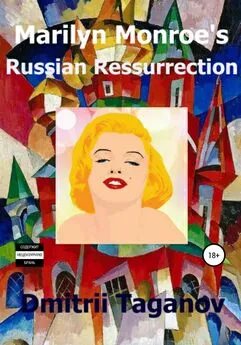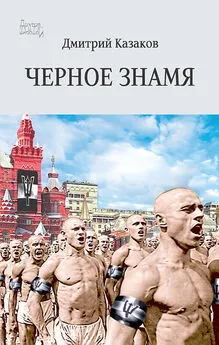Dmitrii Taganov - Marilyn Monroe’s Russian Resurrection
- Название:Marilyn Monroe’s Russian Resurrection
- Автор:
- Жанр:
- Издательство:неизвестно
- Год:2021
- ISBN:нет данных
- Рейтинг:
- Избранное:Добавить в избранное
-
Отзывы:
-
Ваша оценка:
Dmitrii Taganov - Marilyn Monroe’s Russian Resurrection краткое содержание
Marilyn Monroe’s Russian Resurrection - читать онлайн бесплатно ознакомительный отрывок
Интервал:
Закладка:
But a year later his friend and his party boss had organized in the rooms of his district committee a trading cooperative. That was the time when the government, after seventy years of strict ban, permitted their citizens a free private enterprising. They bought vodka in rusty casks made of toxic technical spirits from some criminals, and sold it oddly bottled at food markets. Their firm was registered, of course, as a cooperative for the introduction of new technologies. Every day Fomin passed in the corridors of his district committee the high stacks of plastic crates full of bottles of odd shapes and colors without labels. The piles were so high they blocked slogans and photographs of leading Komsomol members of their district hung on the walls. But the business was to grow. With documents of the mutilated veterans of Afghan-war that were coming back from the battle-fronts by echelons, who were granted then many privileges, Fomin’s young comrades founded a foreign trade co-operative. They brought into the country fake Polish liquors, counterfeit cigarettes, unmixed alcohol “Royal” in two-liter bottles; all of it was tax-free, thanks to mutilated veterans. Money the comrades now earned were fantastic by all the standards of the half-hungry country. Although Fomin did nothing in connection with that dirty profiteering, his special bank account was growing every month as of a senior comrade. All those years Fomin never took a cent of that money. One year later all of it, enough to buy a house and several cars, just vanished during “shock therapy” in the nineties when the account in the state saving bank was simply frozen at first, and then a three-digit inflation annulled it.
Nevertheless, all Fomin’s committee comrades were getting rich, and fully enjoyed it. The country was still locked inside of iron curtain ; nobody had a freedom of crossing the borders, and the foreign currency could be only bought from murky street moneychangers risking a fraud or a plain robbery. That’s why all those crazy by the lean Russian standards money were mostly spent on no less crazy orgies. They added a sauna to the committee building, and every night drinking sprees, with flocks of women, disturbed the neighborhood till daylight. Competing with inflation, they bought badly made but unavailable for ordinary people flashy cars, heaps of bartered clothes made in China and similar vulgar luxuries of newly rich.
Fomin couldn’t then recognize his Komsomol comrades. If he wasn’t a Leninist-materialist he would be sure that Demon possessed them all. However, Fomin believed only in the Marxist-Leninist doctrine, and with advance of perestroika and collapse of the restrictive state economy, his convictions were getting firmer every month. At first he tried to protest their dirty profiteering, putting shame on them, denouncing them as renegades at the Party meetings. However, his comrades and his party boss listened to his speeches with boredom, later with an irritation, and at the end with an open hatred. Everything was falling apart before Fomin’s eyes, the whole world that was regular and settled for seventy years. Socialism and the achievements of great October revolution were collapsing, and heritage of Lenin-Stalin disintegrating.
All that finished suddenly in the ninety-first, immediately after the coup. His Party, the only legal one in the country, had been deprived of all its privileges – with just a signature on the presidential Decree. Those were generous privileges, but Fomin really regretted only one: their recently renovated nifty Committee’s building they had to clear at once.
Just in days all his young comrades were dispersed, but that didn’t much confuse them. They hid their Party-membership cards far away, and never told anyone of their solemn oaths under the banners of great Lenin. They were no more interested in the struggle of the world’s working class; they were stuffing their pockets now. But Fomin found himself on the street, with no job, no helpful skills or money, though with an acute bitterness and the desire of revenge.
They left the cottage in half an hour, three of them sitting at the back of Party’s BMW. Marilyn sat in the middle, looking fixedly forward at the running belt of gray asphalt. She wore the same dark shawl. They were silent all the way. Their car firstly went closer to Moscow, then some miles around it by the ring highway, and then again away from the city, though soon their elegant car turned off the highway to a narrow dirt road. Fomin cleared his throat, and softly, so the driver wouldn’t hear, said, “Marilyn, I beg you, do not upset your daddy, please. It will injure him, he might even die.”
Marilyn did not reply. The car bumped over potholes, and entered the gate of the nursing institution for the aged.
Three of them entered the lobby of the two-storied wooden house and stopped at the vacant office desk. Irritated, Fomin looked around. On the bench in the dark corner of the lobby sat some old men and women looking at newcomers with immense interest. The oldest of them had stood up, “Oh, I’ll find him, wait a minute”.
The attendant was as ancient as the first man, but walked to his desk quite firmly. He opened a thick registration ledger, took a pen, and then sternly looked over his spectacles at Fomin, “Do you have a passport? Whom do you visit?”
Fomin, well acquainted with the routine, just declared full names of the three, and the old man scribbled it down, satisfied. The second name, Marilyn’s, held him up, “Sorry, what’s the last?”
“Monroe.”
‘O, yeah, Monroe, I remember the name. You come frequently to Sedov, a good girl.”
They ascended creaky tilted stairs, passed the corridor with badly worn linoleum, and stopped by the door of thin plywood. Fomin cautiously put his ear to the door, then knocked softly and called, “Dr. Sedov, may we come in?”
As Marilyn crossed the threshold, she cried, "Daddy!" then dashed to the bed, and fell sobbing on the chest of old man. The man lay under the blanket, and just his bald head with unkempt grey beard was seen on the pillow. Fomin and Myacheva stepped shyly closer and stopped at his feet.
Fomin said, “Dr. Sedov, today we escorted your son Sergey on his final journey.”
The old man looked at them with teary bleary eyes and answered with an effort, “What a grief, what a pain! Thank you for coming. Please, sit down.” He got his hand from under the blanket and awkwardly patted the Marilyn’s back. “Daughter, you shouldn’t grieve so much, you know our Sergey may not die, you very well know that.”
“I want to be with him,” howled Marilyn with her head still on old man’s chest. “And I want to go home.”
“Our home is here, daughter. Forever.”
“Oh no, no!” Marilyn had risen rapidly shaking her head, and her blond curls sprang from under the shawl.
“Here are some fruits and grapes we brought for you. Please, take a bite, comrade Sedov,” said Myacheva unwrapping two heavy packages.
Sedov was ninety-two years old. After his second stroke he was paralyzed below the waist. His real name was not Sedov, though that was known only to Fomin. They silently sat by the bed of old man for another half hour, and Marilyn sobbing occasionally. Then she started to feed old man with the grapes, saying, “Please, eat, Daddy dear, eat. You’ve fed us like that at home – remember? Oh, I want to go home, Daddy, I can’t live here any longer,” and she sobbed again.
Finally, Fomin looked at his watch, and with his eyes gave a sign to Myacheva. The woman suddenly roused herself, “Marilyn, my dear, your Daddy is tired, he needs some rest, and we should go. Come with me, I’ll help you to tidy up. Come, my dear.”
Obediently Marilyn followed Myacheva out the door. The old man was still chewing a grape with his toothless mouth, and Fomin cleared his throat.
“Alexander Ivanovich, he arrives in two days,” said Fomin and straightened his back.
The old man ceased chewing and looked up. “So what do you want of me?” He looked really tired, breathing heavily.
“Same thing, Dr. Sedov. Nothing new.”
“He is a mature adult, and I’m a feeble dying man.”
“He will listen to you and do whatever you ask, and you perfectly know that. He wouldn’t decline your demand.”
“Demand? I’ve never demanded anything of him in fifty years. Not a thing!”
“If it’s so, I’m afraid, you wasted these fifty years of his, and twenty five of yours. You lived in vain! You suffered in vain! Why don’t you think of millions, billions of working people around the world? Shame! Thus you will break the promise you had given to the late Secretary General of the Communist Party of the Soviet Union. You will betray the hopes of all the Communists of the world! The history will never forgive it to you. That will bring shame on you for the years to come!”
“OK, I’ll talk to him,” simply said the old man and tiredly closed the eyes. “It’s for him to decide. Please, leave me now.”
“And one last thing, excuse me. Please, allow us to move you out of this impoverished refuge to our cottage? We feel ashamed you live in such a hole.”
“Never! And don’t ever mention it to me.”
Fomin left the room, then waited for his women in the corridor and said to them, “He is very tired, no need to disturb him with farewells, let's go.”
Down in the lobby Fomin met the nurse that looked after the old man, and said to her, “We’ve just visited him, he looks worse. Here, take it for expenses, and feel free with this money.”
When their car reached a smoother road, Fomin turned to Marilyn and said softly, “Your elder brother arrives the day after tomorrow.”
Having heard these words, Myacheva, who sat by Marilyn, uttered a constrained shriek and grasped her breasts with both hands.
7. The Mission Assigned from Death-bed
The old man, who was left at the impoverished home for the aged, and who was known by false name Sedov, was actually the legendary academician, a star of the Soviet science, a proud recipient of the numerous government rewards, and also a former member Central Committee of the Communist Party of the Soviet Union. That was a career-zenith anyone could dream of in this country, but that was thirty years ago.
As a scientist Sedov was occupied then by the mysteries of organic life, but as the member of Ts-Ka of his Party he administered all fields of biology and its researches in dozens of laboratories and institutions. In the early eighties the famous laboratory under his direct leadership was on the verge of epochal discovery, which could bring results worthy of Nobel Prize. Although, Sedov refused to publish anything; he and his colleagues never uttered a word about the matter of their research outside their laboratory. That was very right thing to do, as it would have had revealed later.
The theme of their epochal discovery was the cloning, that is indistinguishable, as facsimile copying of any living beings, but at the molecular and genetic level. There was some experimenting with cloning also abroad; cloned lambs, doggies and other animals were born in some laboratories, but they didn’t live long and died in extreme anguish. Soviet renowned scientist and ardent communist Sedov attained then an unbelievable advancement in genetics and practical cloning; he could not just clone, but could now make some sort of fax-copies, and almost send them by wire – of the human beings. To make a perfect human clone he needed just clipped off scraps of nails or a lock of hair, and a pair of smears taken from the private parts, preferably of original human person’s, but his immediate kin’s would also could do. The clone would turn out healthier if could be used tissues of his intestines, but still better from his head.
Читать дальшеИнтервал:
Закладка:










